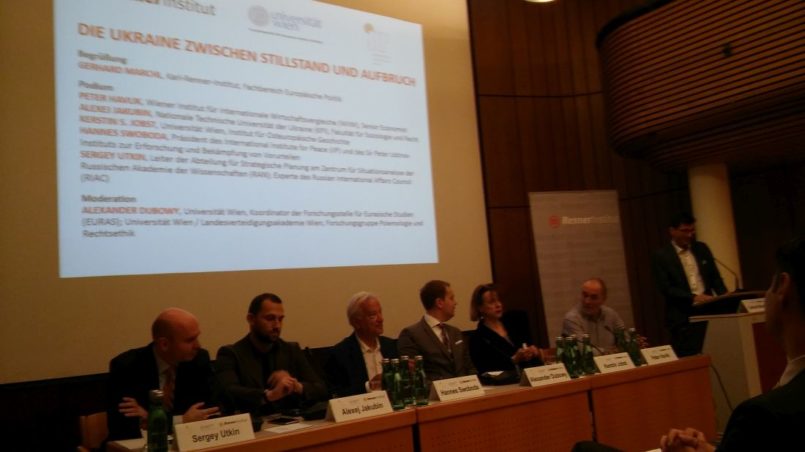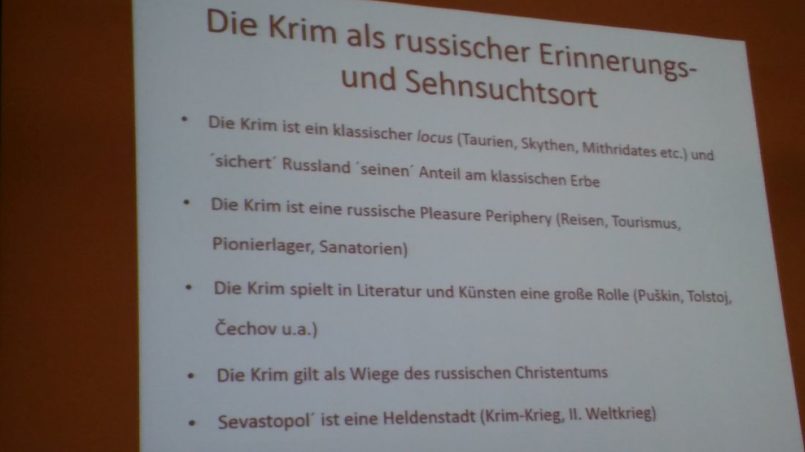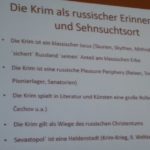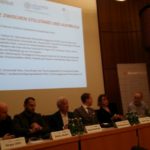Ukraine caught between stagnation and awakening

The move away from the formal republic towards a presidential republic is the most central change in Ukraine, according to Alexej Jakubin. But two-thirds of Ukrainians are not satisfied with the current government’s work. This is partly because the oligarchs continue to determine the policy and have even gained in power. On the other hand, the Maidan movement expects a new social contract with the people, as the majority of the middle and lower classes continue to live in poverty. Also, there have been close to no reforms, the only goal achieved so far, is the reduction of government spending (one of the classic requirements of the IWF).
The new Prime Minister Vladimir Groisman, who replaces the failed Arseni Jazenjuk, is taken as a sign of hope by some, even though his signals are somewhat contradictory. Many (from Russia) see Groisman but as a viceregent of Poroshenko’s – as Medvedev used to be for Putin.
More attention is currently awarded to the fighter pilot returned from Russian captivity, Nadezhda Savchenko. She stands behind the Minsk agreement, but believes that one must change the technical implementation. Also, she aims at a direct contact with representatives of East Ukrainia, which President Poroshenko decidedly refuses.
Peter Havlik sees the economic conditions of the International Monetary Fund as one of the main reasons for the economic pressure on the Ukrainian middle class. True, the economic data has improved lately, also the Ukrainian currency has somewhat stabilized. However, it is still too early to be able to speak of an awakening. Ukraine is still caught up in a phase of stagnation. The prospect of the country joining the EU in the foreseeable future, is illusory, according to Hawlik. With the DCFTA Agreement (Free-trade zone between Ukraine and he EU), the failure to sign which having been one of the triggers to start the Maidan-protests; Ukraine took over more than 60 percent of the EU rules concerning free trade, human rights etc. Many duties have been abolished, for Ukrainian exports to the EU, but especially in the food industry, there are quotas. Russia is still the primary trading partner, but exports have plummeted thanks to the mutual embargoes. Exports to the EU, have not been able to compensate these losses, even here there was a drop in 2015 by 8 percent. Moldova and Georgia, having concluded a similar agreement with the EU, could boost exports greatly in the EU – this is probably the hope for Ukraine, too.

Kerstin Jobst provocatively puts up the question, whether Ukraine can ever claim an independent statehood, or, as the American Eastern Europe expert van Hagen asked, “Does Ukraine have a history?” Jobst answeres the question with a “clear yes and no” and complains that there is no single academic Chair of Ukrainian history throughout Western Europe. From the Russian perspective Great Russians (Russia), Belarusians and Ukrainians are brothers. The Medvedev Doctrine of 2001, which is also the basis for Russia’s intervention in Ukraine, is aimed at protecting Russian citizens outside Russia.
Jobst then presents five theses on the history of Ukraine:
- Ukraine, for many Europeans within the EU, is a surprising or in fact a disturbing reality. As an example, the elections of 2004 are mentioned, where protests from the EU against the transpired election rigging were practically absent. Only Poland and Estonia tried to put focus on this issue. Jobst further criticizes, that there was no offer from Brussels for closer cooperation after the Orange Revolution 2004/5. The Ukraine was considered not to be European enough, too poor and backward. European politicians had both their own economies, as well as Russian interests to consider.
- The Ukrainian national consciousness has developed in contrast to the Russian and the Polish national project. 17% of Ukrainians are ethnic Russians, russophonia is strong, there are many mixed marriages. Many Ukrainian Russians remain faithful to Ukraine, even in the current crisis. The Polish-Ukrainian relationship has long been very conflicted, Polish elites negated the Ukrainian ethnos. Today the relationship is very positive, as can be seen in the high number of refugees taken in by Poland.
- Ukraine is a fragmented state. The West is Catholic, the East orthodox. The colloquial language speaks of the “five Ukrainians”, referring to the many different regions and cultures and the varying acceptance of the project Ukraine therein.
- Ukraine is victim and perpetrator at the same time. Victim, especially in World War II under the rule of the Soviet Union, where Holodomor and Stalinist purges took place. Many even see the Chernobyl accident as an attack on the Ukrainian people. Yet, they are also the perpetrator in the form of collaboration with the Nazis or the misdeeds of some right-wing units in the current conflict.
- The Crimea is of a Russian character. 1783 Russia annexed the peninsula from Turkey. In addition to the Russian majority population, there are about 12-15 percent Crimean Tatars living there, who were deported under Soviet rule and later came back. The Crimea was ethnologically always a highly dynamic region. According to polls, today about 80 percent of the population agree to a connection to Russia.
Hannes Swoboda describes the view of the European Union on the events which have led to the Ukraine conflict. Predating 2013, Ukraine’s accession was not sought by the EU. Partly in deference to Russia, partly because the EU had recognized that they had grown too quickly, and there were problems with recently acceded countries. The large Ukraine would have been more than the EU could handle, for the foreseeable future.
The Yanukovych-backdown from the Association Agreement in 2013 came as a surprise for the EU, even though there had always been rumors, based primarily on an objection of Russia though. From that side however, official channels only ever communicated: This is a matter for Ukraine.
The West and NATO have expanded to the east, despite an agreement between the foreign ministers in office at that time. But Swoboda emphasizes, that this expansion has taken place on a voluntary basis. He thinks nothing of zones of influence – whether the American Monroe Doctrine or the Medvedev Doctrine – they are not enshrined in international law. As the winner of the Cold War, the West would have had to involve Russia more heavily in the long-term planning.
Currently, Swoboda sees no chance to overcome the conflict, as there is no willingness to talk on either side. The East Ukraine population suffers, it is supported neither by Ukraine nor Russia sufficiently. The OSCE is limited in their ability to act, the organization can not offer the suffering people protection. It would be necessary, to adopt a new OSCE mandate or even better, a UN mandate, with far-reaching powers so that the Minsk line is not permanently injured from both sides. Furthermore, one would have to renegotiate Minsk 2, as already suggested by Jakubin.
To avoid conflicts of this kind in the future, a pan-European security structure needs to be developed with involvement of Russia. The NATO-Russia-Council is not suitable for this purpose. This security structure should provide a peace order that could exist alongside NATO. To this end, we should also seek to establish a cooperation with the Eurasian Economic Union, run by Russia.
According to recent polls, Ms. Timoshenko ranks far ahead of President Poroshenko in popularity. However, just how the factor of the combat pilot Sawchenko would weigh in at any election, is not yet clear.

The relationship between Russia and the West can return to normal in the next few years, according to Sergey Utkin. Relations with Ukraine however, are devastated for a long time to come. He advocates that history should not determine the current policy, otherwise one will never arrive at solutions. The stabilization of the Donbass region is possible, the current negotiations between Russia and the US are a good way. The USA expect a change in the Russian attitude, but no one can say if and when this will happen. Many in Russia would look on a yield in the Ukraine conflict as a sign of weakness. Rationally, on the other hand, many also know that the current situation hurts both sides, especially economically. Still, with the recent exchange of prisoners and the Minsk negotiations, at least things are moving again on the matter. Both sides have their national resistance that they can not overcome: In Russia, many wonder what there is to gain in meeting Ukraine halfway, while in Ukraine there is no clarity, as to how to deal with the Eastern Ukraine – isolation or reintegration. In all these discussions, however, the affected people are forgotten. It may well take international organizations to overcome this conflict – and both sides, says the man from the Russian Academies, should contribute to it. 1 million internally displaced persons and 800.0000 in neighboring countries – mainly in Russia and Poland – are enough. After the end of hostilities there must be a “Marshall Plan for Ukraine”, in which the EU and Russia should participate.
When asked, what Russian policy might look like in 25 years, Utkin describes two alternative scenarios: a distinction from the West, which will lead to an erosion of cooperation with the EU, or internationalization, which is favoured especially by the Youth.
In answering following questions from the audience, the Ambassador of Ukraine, Dr. Olexander Scherba takes the word to – from his perspective – rectify some statements. The economic recovery in 2016 is noticeable, both in the textile as well as in automotive, housing and construction sector. In the IT sector Ukraine is now a leader. The EU membership has always been object of Ukraine, not the EU. Concerning the fragmentation of Ukraine, Scherba observes that each and every country is fragmented to a certain extent, and names Vorarlberg as an example. In all of his statements it can be noted that Russian President Putin, to him, is the only culprit in the current situation in Ukraine, and that he finds too much Ukraine bashing in the Western media – an impression that the author can not really share. As the moderator of the discussion withdraws the word from the ambassador, he leaves.
The theory that America or its intelligence services have triggered the Maidan revolution, Swoboda awards little importance. He acknowledges that the United States – as well as Russia – undoubtedly pursue their interests in Ukraine. The demonstrations however, were organized but by Ukrainians who were fed up with the oligarch system and wanted a connection to the West. Rejecting the Foreign Ministers-in-office’s compromise back then, was a crucial mistake. The right-wing extremists involved in the Maidan were only a small part of the demonstrators.
The forced upkeep of the concept of a hostile opposed party, can only be overcome by a termination of stereotyping (Stalinist Russians, extreme right Ukrainians). Currently too few forces are working toward a peace order. If one could manage to pacify the conflict (meaning, that it does not cost even more human lives), that might not be a solution, but still better than open conflict.
On the role of oligarchs, Jakubin notes that they have a paradoxical attitude: on the one hand they have lost up to 80 percent of their assets in the conflict, according to estimates. On the other hand many gain from the crisis. A new club of oligarchs has formed around Poroshenko, himself a billionaire (and referred to by Jakubin as the most powerful oligarch of Ukraine). This association is in conflict with other oligarchs such as Rinat Akhmetov in East Ukraine, especially where state resources come into play. The fact that the oligarchs only have their own assets in mind, shows in Poroshenko’s response to the question of why he would not sell his assets, since after all there must be conflict of interest with his position: He could not sell now, on account of not receiving a good price at this time.
A starting point for the development of Ukraine would be to develop regions in neighboring countries via EU funding, and thus to create an economic engine for the border regions. The concept of the International Monetary Fund (saving and privatization) is considered as too simple if not wrong, by all the discussants – meanwhile even the IMF itself is no longer really convinced that this old concept is always the right way. From Europe, Jakubin is hoping to see solutions beyond the neoliberal ideology of the IMF. Europe can campaign for a dialogue between the top and the middle or lower classes. The visa regime should be eased. Last but not least, the government must finally implement its promises.
Translation from German: Serena Nebo
Credits
| Image | Title | Author | License |
|---|---|---|---|
 |
krim | Christian Janisch | CC BY SA 4.0 |
 |
test1 | Christian Janisch | CC BY SA 4.0 |
